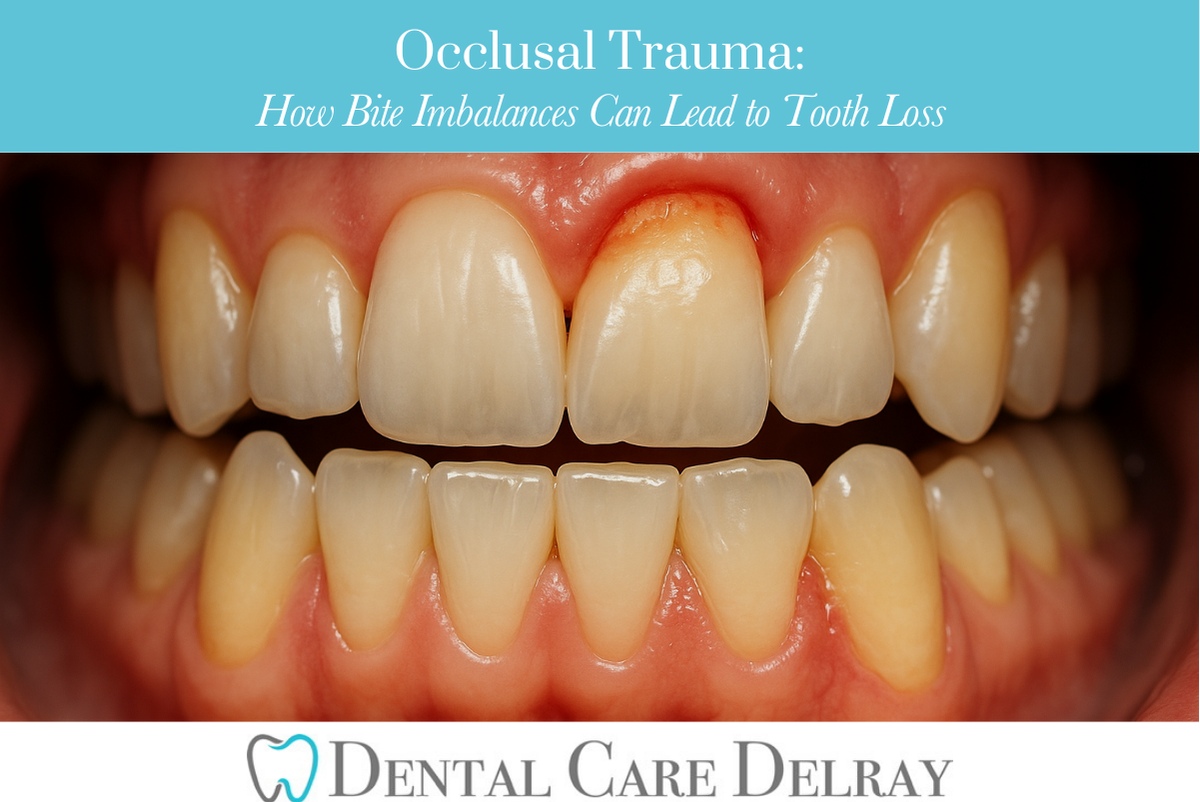 Dental Care Delray – Your Partner in Lifelong Dental Wellness
Dental Care Delray – Your Partner in Lifelong Dental Wellness
At Dental Care Delray, we often emphasize that a healthy smile involves more than just clean teeth and gums—it also means a balanced, functional bite. One of the lesser-known but serious issues affecting dental health is occlusal trauma, a condition that occurs when there is excessive or unbalanced force on your teeth due to an improper bite, clenching, or grinding. If left untreated, occlusal trauma can contribute significantly to tooth mobility, gum recession, bone loss, and ultimately tooth loss.
Let’s explore this important dental topic and how early detection and intervention at Dental Care Delray can help you preserve your smile for life.
🦷 What Is Occlusal Trauma?
Occlusal trauma refers to the injury or damage that occurs to the teeth and their supporting structures—like the periodontal ligament and alveolar bone—because of abnormal or excessive forces during biting or chewing.
There are two main types:
- Primary Occlusal Trauma: Occurs when excessive force is applied to a tooth or teeth with healthy supporting structures (e.g., from clenching, grinding, or a poorly aligned dental restoration).
- Secondary Occlusal Trauma: Happens when even normal biting forces damage teeth that already have compromised support due to periodontal disease or bone loss.
💥 How Occlusal Trauma Leads to Tooth Loss
If not addressed, the constant pressure and force from occlusal trauma can cause:
- Loosening of teeth due to stretched or damaged periodontal ligaments
- Widening of the tooth socket, causing instability
- Loss of bone around the affected tooth
- Inflammation of surrounding tissues, accelerating periodontal disease
- Fractures or cracks in the teeth
These effects not only compromise the integrity of your teeth but also make them more susceptible to infection and decay. Over time, this can result in irreversible damage and tooth loss.
🔍 Signs and Symptoms of Occlusal Trauma
If you’re experiencing any of the following, you may be suffering from occlusal trauma:
- Tooth sensitivity or pain when biting
- Loosened or shifting teeth
- Gum recession
- Headaches or jaw pain (especially upon waking)
- Tooth wear or flattening of biting surfaces
- Clicking or popping sounds in the jaw
- Cracks or fractures in teeth
Don’t ignore these warning signs—early intervention can prevent severe consequences.
🛠️ Diagnosis and Treatment at Dental Care Delray
At Dental Care Delray, we perform a thorough bite analysis as part of our comprehensive oral exams. If occlusal trauma is suspected, we use diagnostic tools like:
- Digital bite analysis (T-Scan)
- Intraoral cameras
- Periodontal probing
- X-rays to assess bone levels
Treatment options may include:
- Occlusal adjustment – reshaping the biting surfaces of teeth
- Nightguards or splints – to reduce grinding and clenching pressure
- Orthodontic treatment – to correct bite alignment
- Restorative dentistry – to rebuild worn or damaged teeth
- Periodontal therapy – if gum disease or bone loss is involved
🧠 Q&A: Common Questions About Occlusal Trauma
Q: Can occlusal trauma happen even if I don’t have cavities or gum disease?
A: Yes. Occlusal trauma can affect otherwise healthy teeth and gums if excessive force is applied regularly through grinding, clenching, or malocclusion (bad bite).
Q: Is tooth grinding the same as occlusal trauma?
A: Grinding (bruxism) is a cause of occlusal trauma. While bruxism doesn’t always lead to damage, chronic grinding can result in trauma to the supporting structures of the teeth.
Q: What’s the difference between primary and secondary occlusal trauma?
A: Primary trauma occurs in healthy teeth with excessive force; secondary trauma occurs in teeth that are already weakened by bone or gum loss.
Q: Can occlusal trauma be reversed?
A: While some effects like inflammation or mobility may improve with treatment, advanced damage like bone loss or tooth fracture is irreversible. That’s why early diagnosis is key.
Q: Will I need surgery for occlusal trauma?
A: Most cases can be managed with conservative treatments like nightguards, occlusal adjustments, or orthodontics. Surgery is only considered if there’s significant structural damage.
👨⚕️ Protect Your Smile at Dental Care Delray
If you suspect you’re grinding your teeth, have jaw pain, or notice changes in how your teeth fit together, don’t wait. These may be early signs of occlusal trauma—and the sooner it’s treated, the better the outcome.
Contact Dental Care Delray today to schedule your bite assessment or comprehensive exam.
📍 Dental Care Delray
5130 Linton Blvd # D2
Delray Beach, FL 33484
📞 Phone: (561) 496-2222
🌐 Website: dentalcaredelray.com
Your bite matters. Protect your teeth, jaw, and overall oral health with expert care from the trusted team at Dental Care Delray.
